How to Spot Scams on Upwork

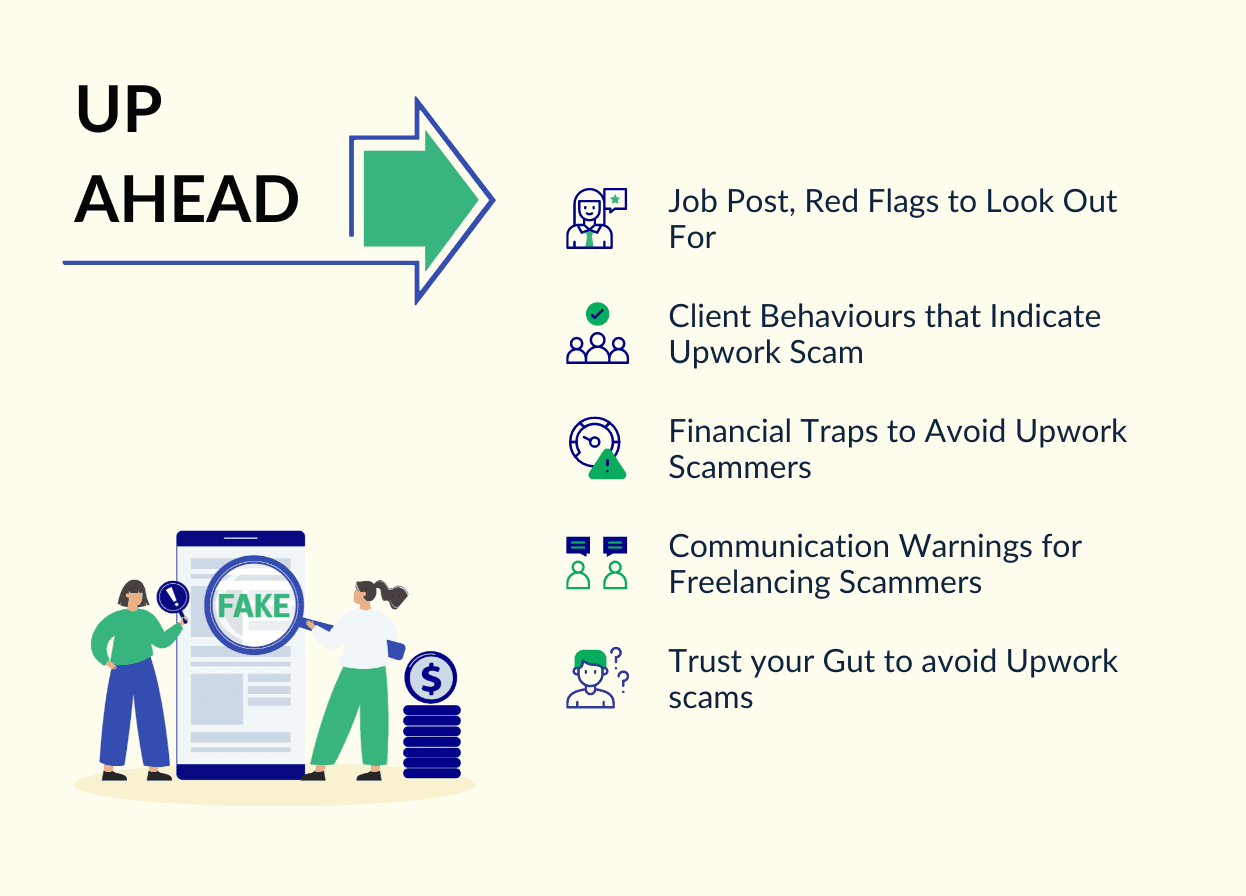

Upwork is one of the most popular and trusted platforms for freelancers and clients to connect and collaborate. As of 2023, the platform has about 12 million freelancers and 814,000 active buyers.
However, as with any online marketplace, scammers try to exploit unsuspecting freelancers and trick them into doing work for free, stealing their personal information, or paying them with fake or stolen money.
As a freelancer, you need to be vigilant and aware of the common scam tactics and red flags that can help you avoid falling victim to these fraudsters. This blog provides 5 key tips and FAQs on how to spot scams on Upwork and safeguard your freelance career.
5 Key Tips for Spotting & Avoiding Upwork Scams
Here is your answer to “How to avoid scams on Upwork?”
1. Job Post, Red Flags to Look Out For
A scam job post may have one or more of the following characteristics.
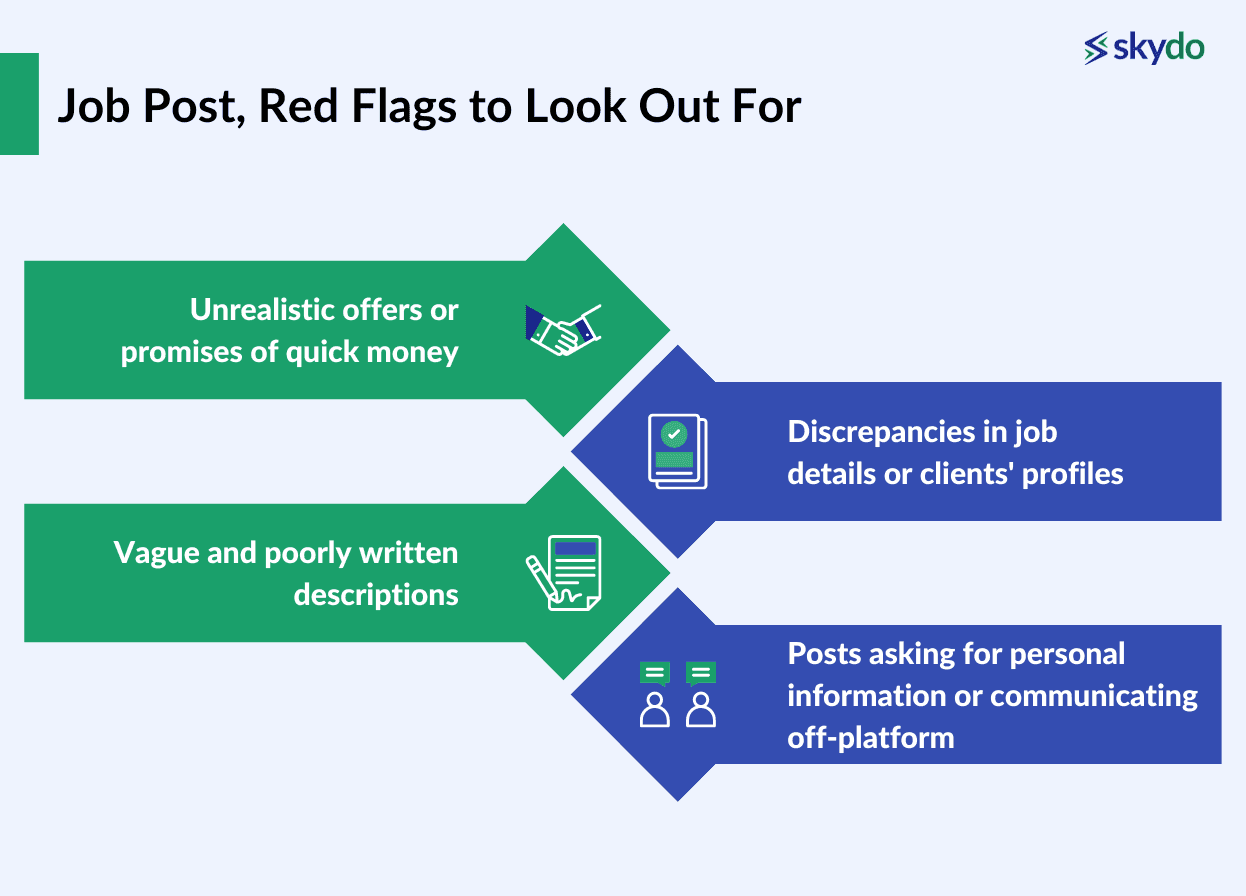
- Vague and poorly written descriptions
Scammers may use generic or copied descriptions that lack details about the project, the client, or the expectations. Look for clear and specific descriptions that match your skills and experience to avoid such Upwork scams.
- Unrealistic offers or promises of quick money
Fraudsters may lure you with offers that seem too good to be true, such as paying very high rates, arranging long-term work, or promising incentives or bonuses. Be realistic and cautious about the market rates and the client’s expectations and budget.
- Posts asking for personal information or communicating off-platform
Using Upwork's platform and tools could expose you to risks of phishing, identity theft, and malware. You may also be asked to communicate with them outside of the platform, such as via email, phone, Skype, or other platforms.
To avoid such scammers on Upwork, don't share or communicate information that violates Upwork's terms of service.
- Discrepancies in job details or clients' profiles
Scammers may use fake or stolen client profiles that do not match the client’s history or job details. Check out the client’s profile for reviews, feedback, and verified payment methods for your safety.
2. Client Behaviours that Indicate Upwork Scam
A scam client might exhibit the following behaviour.
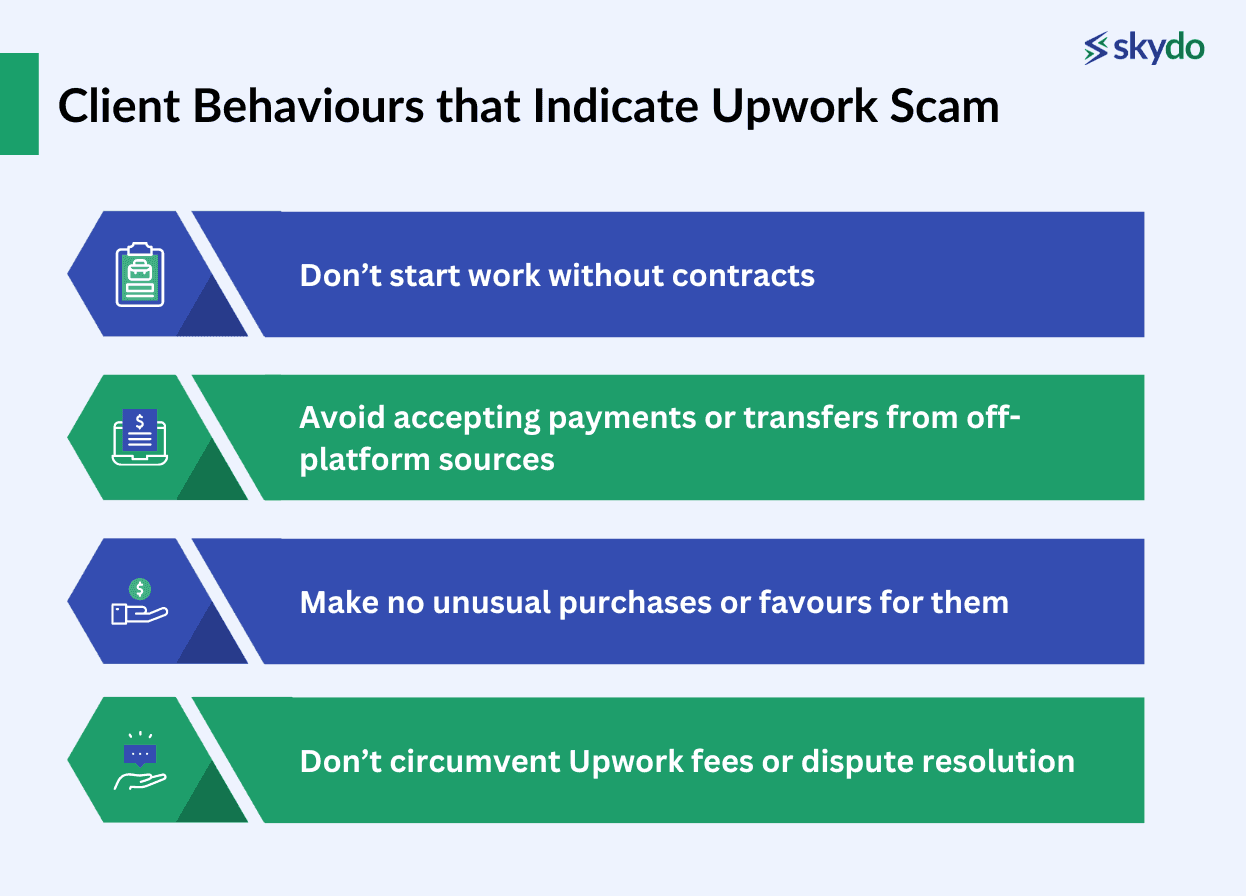
- Don’t start work without contracts
Scammers may pressure you to provide work without setting up milestones, contracts, or escrows. Don’t agree to anything before securing your payment.
- Avoid accepting payments or transfers from off-platform sources
Scammers may lure you with reasons such as convenience, fees, or taxes to pay outside of Upwork. This can expose you to risks of not getting paid, losing money, or facing legal issues. Avoid such freelancer scams by refusing to accept payments offsite on the platform.
- Make no unusual purchases or favours for them
Some scammers ask you to purchase things for them with your own money, such as software, equipment, gift cards, or subscriptions. It is a definite red flag, and you must avoid falling for it at all costs.
- Don’t circumvent Upwork fees or dispute resolution
Fake clients who are trying to scam you may ask you to end or cancel contracts, leave positive feedback, or mark work as complete to avoid paying Upwork fees and facing dispute resolution. Report such Upwork scammers and ask the platform to take action against them.
3. Financial Traps to Avoid Upwork Scammers
Financial traps may include the following scenarios.
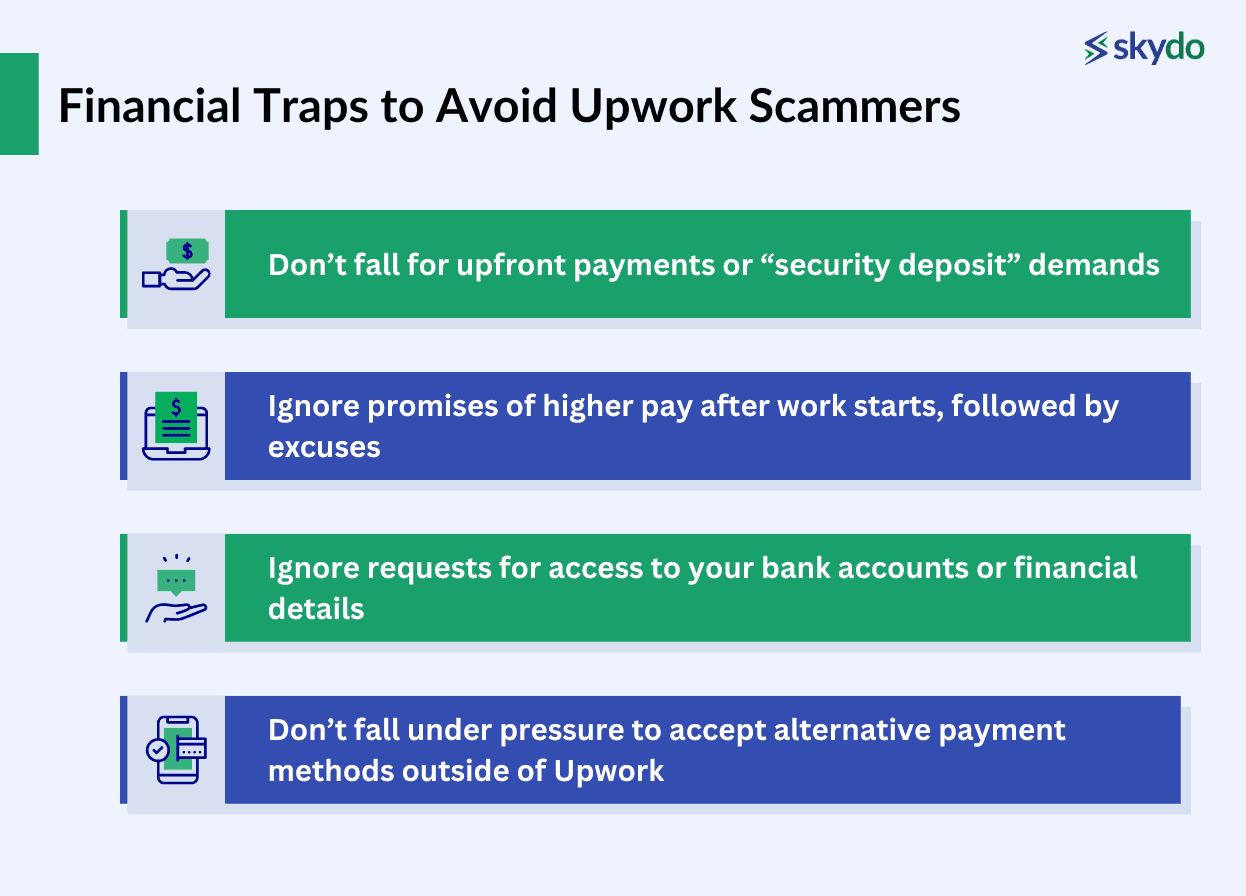
- Don’t fall for upfront payments or “security deposit” demands
Upwork scammers may ask freelancers for upfront payments or security deposits before beginning work. They may claim that this is to ensure the freelancer’s commitment, quality, or availability.
No client asks to pay upfront fees or security deposits. Instead, use Upwork’s Milestone Payment system to ensure that you get paid for completed work.
- Ignore promises of higher pay after work starts, followed by excuses
When it’s time to pay, scam clients may make excuses, say they have technical problems, financial problems, or personal emergencies, and ask you to do more work without paying you.
You must discuss and agree on the payment terms and scope of work before starting the project. If the client changes the scope of work, renegotiate the payment terms.
- Ignore requests for access to your bank accounts or financial details
Potential scammers may ask freelancers for their bank account numbers, routing numbers, PINs, passwords, or other financial information. They may claim that this is necessary for processing payments, verifying identity, or transferring funds.
Upwork or verified clients never ask for your bank account details or financial information. Use Upwork’s payment system to receive payments.
- Don’t fall under pressure to accept alternative payment methods outside of Upwork
It is common for scammers to force freelancers to accept payment methods such as cash, wire transfers, cryptocurrencies, and prepaid cards.
If a client insists on using an alternative payment method, it is likely a scam. Accept payments only through Upwork's payment system.
4. Communication Warnings for Freelancing Scammers
A communication warning may include one or more of the following signs.
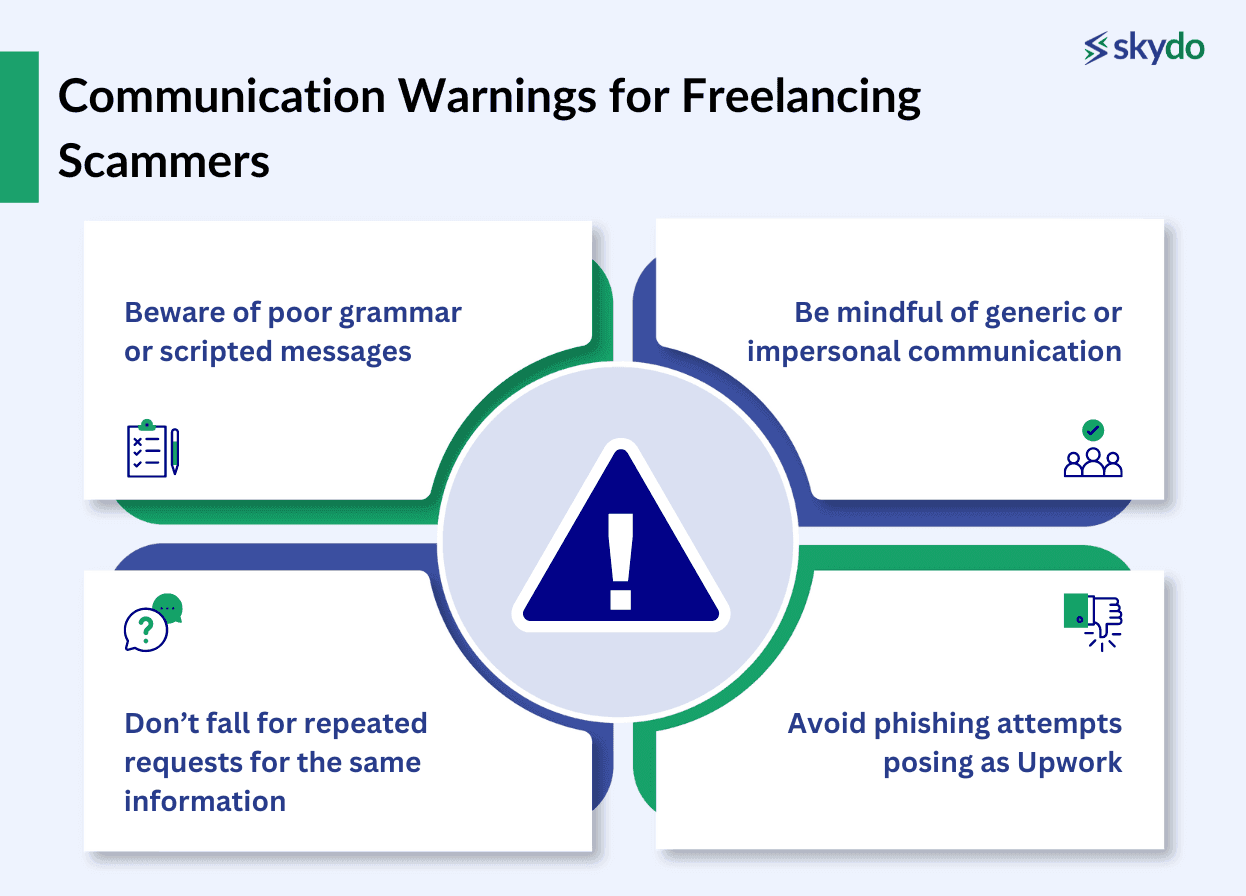
- Beware of poor grammar or scripted messages
Messages from scammers may contain spelling, punctuation, or word choice errors or sound as if they were prewritten. Check the message for errors or inconsistencies and ask follow-up questions to verify the sender's legitimacy.
- Be mindful of generic or impersonal communication
A scammer may contact you with vague or generic salutations or without showing any interest in your profile or skills. Ignore messages that do not address you by name or do not mention your specific qualifications.
- Don’t fall for repeated requests for the same information
With the excuse that they need it for verification or security reasons, scammers may ask you for your personal or financial information more than once.
Do not share sensitive information on Upwork with anyone, and notify Upwork support if you receive any suspicious requests.
- Avoid phishing attempts posing as Upwork
Scammers may trick you into clicking harmful links, downloading malicious attachments, or entering your login credentials or personal information on fake websites or forms that pretend to be Upwork or its affiliates.
Always check the sender’s email address, the URL of the website, and the security certificate of the form before clicking, downloading, or entering anything.
5. Trust Your Gut to Avoid Upwork Scams
Trust your gut and intuition when it comes to spotting scams on Upwork. If something feels wrong or too good to be true, it probably is. Follow these steps if you encounter any gut-feel scams.
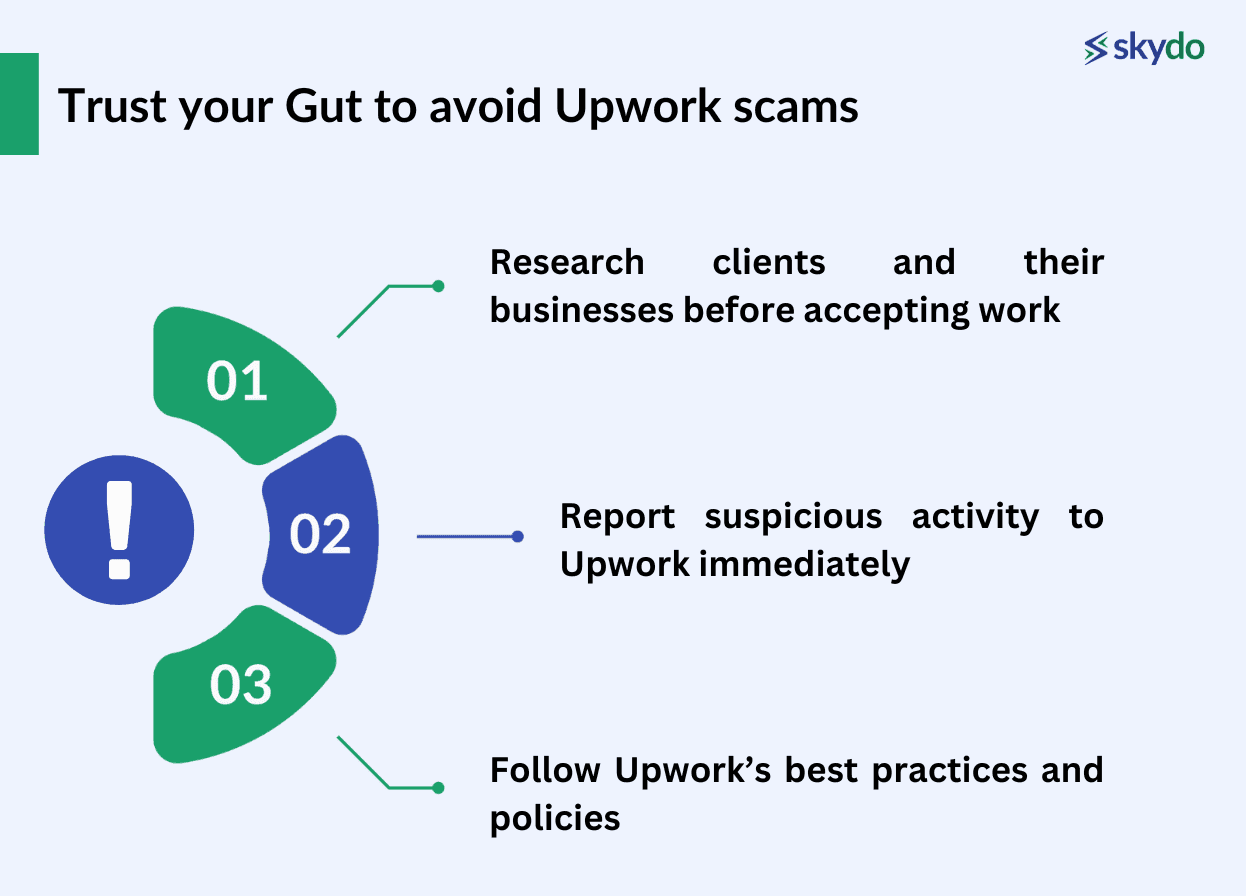
- Research clients and their businesses before accepting work
Check their profiles, reviews, feedback, portfolios, websites, social media, and online presence. Look for inconsistencies, discrepancies, or red flags. Ask for references, testimonials, or samples of their previous work.
- Report suspicious activity to Upwork immediately
If you encounter or suspect a scam, fraud, or violation on Upwork, report it to Upwork as soon as possible. Wondering how to report someone on upwork? Use the flag or report buttons on the job posts, proposals, contracts, or messages.
- Follow Upwork’s best practices and policies
Use Upwork’s platform and features to communicate, collaborate, and transact with clients. Contracts, milestones, escrow, and payment methods ensure your work and money are protected.

Conclusion
Scams on Upwork are rare, but they do happen. To protect yourself and your career, you need to be aware of the common signs and tactics of scams on Upwork and how to avoid them.
Remember, if something sounds too good to be true, it probably is. Always trust your gut and report any suspicious activity to Upwork as soon as possible.
For more information and support, you can also visit Upwork’s official resources and contact options. Thank you for reading, and stay safe!
FAQs
Q1. What happens if you get scammed?
Ans. If you get scammed on Upwork, don’t panic. Cut off all contact with the scammer and report them to Upwork with evidence.
Next, contact your bank or payment provider and ask for a refund or cancellation. Protect your identity and online security by changing your passwords, enabling two-factor authentication, and monitoring your accounts. You may also need to contact the authorities or identity theft protection services.
Q2. How to know if an Upwork job is legit?
Ans. To find legit jobs on Upwork, look for these indicators.
- The client’s profile and history. Check their online reputation, payment methods, and feedback. Avoid clients with no or negative reviews, disputes, or complaints.
- The job description and requirements. Read them carefully and look for clear and specific details. Avoid jobs that are vague, poorly written, or unrealistic, or that ask for personal information, off-platform communication, or upfront payments.
- Be professional, and respectful, and ask questions. Avoid clients who are rude, pushy, or unresponsive, or who make unreasonable or unethical requests or demands.






